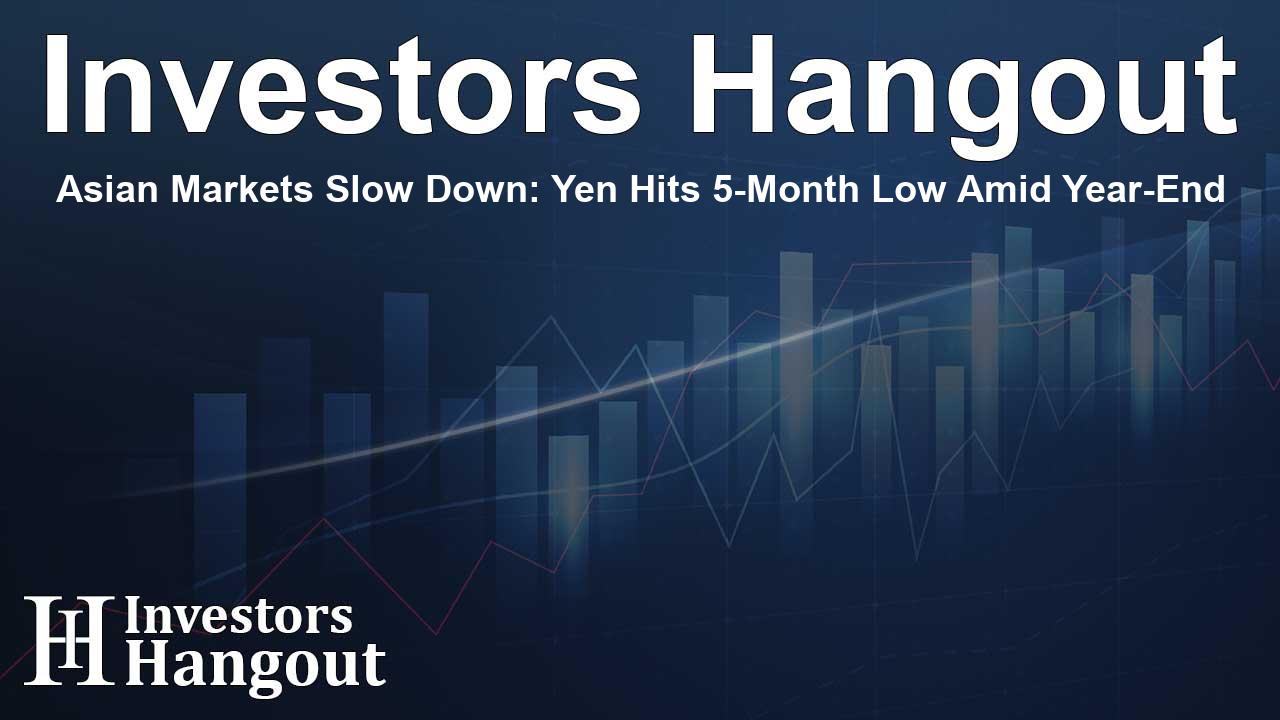Asian Markets Slow Down: Yen Hits 5-Month Low Amid Year-End

Asian Markets and the Yen's Current Status
Asian stock markets displayed fluctuations recently, signaling caution among investors. The yen remained under pressure, approaching levels not seen for five months, as trading eased with the year coming to an end. As investors start to focus on 2025, various factors are shaping their expectations regarding economic trends and interest rates.
The Federal Reserve and Interest Rate Projections
Anticipation is swirling around the actions of the Federal Reserve as it considers its interest rate cuts. Economists expect a more measured approach in 2025, influencing market behavior. Unlike the Fed, which is projected to implement only two interest rate cuts next year, the Bank of Japan is contemplating potential rate increases. This divergence between monetary policies is crucial in determining currency strength and investor sentiment.
The Yen's Struggles in 2024
This year, the yen has lost more than 10% of its value against the dollar, marking its fourth consecutive year of decline. On a recent trading day, the yen was valued at around 157.80 per dollar. Traders are closely monitoring the yen’s movement as it approaches critical levels that could prompt intervention from Japan’s central bank.
Performance of Asian Stock Markets
While the yen continues to struggle, Asian stock indices have shown varied performances. The MSCI Asia-Pacific index, excluding Japan, recorded slight gains, closing the day at 574.88, which is nearly 9% higher than the previous year. Japan's Nikkei index increased by 0.77%, bolstered by the weak yen, setting a promising path for a 19% rise in 2024. Meanwhile, China's blue-chip and Hong Kong indices exhibited minimal changes.
Investor Sentiment Moving Towards 2025
With only limited trading days remaining in the current year, investors are increasingly looking ahead. The shifting economic landscape, particularly concerning international trade and geopolitical tensions, plays a significant role in their strategies. Analysts note that barring any major surprises, market direction may remain ambiguous as the year wraps up.
Key Economic Indicators and Their Implications
As expectations adjust around U.S. monetary policy, the yield on 10-year Treasury bonds has reached its highest level since early May, currently sitting around 4.57%. Additionally, the dollar index, which reflects the dollar’s strength against several international currencies, has approached its two-year high.
Trends in Commodities
In the commodities market, gold prices have decreased slightly to $2,631.34 per ounce but are still on track for a remarkable 28% increase throughout the year, marking the best performance for gold since 2011. Oil prices have also seen a downward trend, with both Brent crude and U.S. West Texas Intermediate crude dropping 0.1% during early trades.
Conclusion: The Path Ahead
As we look forward to 2025, the Asian markets remain in a state of flux, influenced by various economic policies and market dynamics. Investors are hopeful for stabilizing trends and are eager to see how geopolitical events and restructuring of trade policies may affect currency values and stock performances.
Frequently Asked Questions
What is the current state of the Asian stock markets?
The Asian stock markets are experiencing fluctuations with investor caution, particularly influenced by the yen's performance and Fed rate projections.
How is the yen performing against the dollar?
The yen is trading around 157.80 per dollar, reflecting a significant decline of over 10% in value this year.
What are the expectations from the Federal Reserve in 2025?
Analysts anticipate that the Federal Reserve will adopt a more measured approach, projecting only two interest rate cuts next year.
What movements are observed in commodities, particularly gold?
Gold prices have seen a slight decrease but are set for an impressive annual rise of about 28%, the strongest since 2011.
How are geopolitical tensions influencing market behavior?
Geopolitical tensions are creating uncertainty, impacting trading strategies and investor sentiment in Asian markets as they move toward 2025.
About Investors Hangout
Investors Hangout is a leading online stock forum for financial discussion and learning, offering a wide range of free tools and resources. It draws in traders of all levels, who exchange market knowledge, investigate trading tactics, and keep an eye on industry developments in real time. Featuring financial articles, stock message boards, quotes, charts, company profiles, and live news updates. Through cooperative learning and a wealth of informational resources, it helps users from novices creating their first portfolios to experts honing their techniques. Join Investors Hangout today: https://investorshangout.com/
Disclaimer: The content of this article is solely for general informational purposes only; it does not represent legal, financial, or investment advice. Investors Hangout does not offer financial advice; the author is not a licensed financial advisor. Consult a qualified advisor before making any financial or investment decisions based on this article. The author's interpretation of publicly available data shapes the opinions presented here; as a result, they should not be taken as advice to purchase, sell, or hold any securities mentioned or any other investments. The author does not guarantee the accuracy, completeness, or timeliness of any material, providing it "as is." Information and market conditions may change; past performance is not indicative of future outcomes. If any of the material offered here is inaccurate, please contact us for corrections.